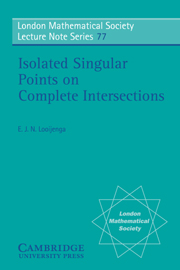Book contents
- Frontmatter
- Contents
- INTRODUCTION
- CHAPTER 1 EXAMPLES OF ISOLATED SINGULAR POINTS
- CHAPTER 2 THE MILNOR FIBRATION
- CHAPTER 3 PICARD-LEFSCHETZ FORMULAS
- CHAPTER 4 CRITICAL SPACE AND DISCRIMINANT SPACE
- CHAPTER 5 RELATIVE MONODROMY
- CHAPTER 6 DEFORMATIONS
- CHAPTER 7 VANISHING LATTICES, MONODROMY GROUPS AND ADJACENCY
- CHAPTER 8 THE LOCAL GAUSS-MAN IN CONNECTION
- CHAPTER 9 APPLICATIONS OF THE LOCAL GAUSS-MANIN CONNECTION
- REFERENCES
- INDEX OF NOTATIONS
- SUBJECT INDEX
CHAPTER 6 - DEFORMATIONS
Published online by Cambridge University Press: 17 March 2010
- Frontmatter
- Contents
- INTRODUCTION
- CHAPTER 1 EXAMPLES OF ISOLATED SINGULAR POINTS
- CHAPTER 2 THE MILNOR FIBRATION
- CHAPTER 3 PICARD-LEFSCHETZ FORMULAS
- CHAPTER 4 CRITICAL SPACE AND DISCRIMINANT SPACE
- CHAPTER 5 RELATIVE MONODROMY
- CHAPTER 6 DEFORMATIONS
- CHAPTER 7 VANISHING LATTICES, MONODROMY GROUPS AND ADJACENCY
- CHAPTER 8 THE LOCAL GAUSS-MAN IN CONNECTION
- CHAPTER 9 APPLICATIONS OF THE LOCAL GAUSS-MANIN CONNECTION
- REFERENCES
- INDEX OF NOTATIONS
- SUBJECT INDEX
Summary
In previous sections we studied map-germs f : (Cn+k, 0) → (Ck, 0) defining an icis (X0, 0) of dim n without worrying to what extent invariants of f were really invariants of (X0, 0). In order to answer this question we must fix (X0, 0) and compare the various f : (Cn+k, 0) → (Ck, 0) which define (X0, 0) (so k varies also). A simple method by which we get new defining equations out of old is to choose a germ
g : (Cn+k×Cℓ, 0) → (Ck, 0) with g(z, 0) = f(z): then F : (Cn+k+ℓ, 0) → (Ck+ℓ, 0), F(z, u) = (g(z, u), u) defines the same singularity as f. It appears that there exist germs f : (Cn+k, 0) → (Ck, 0) defining (X0, 0) which are in some sense saturated with respect to this process: any extension F of f obtained as above is analytically equivalent to the trivial extension f×1(Cℓ, 0). We call them versal deformations of (X0, 0) (allthough this is not quite the way by which we shall define this notion). Versal deformations appear to be unique in the sense that of two versal deformations of (X0, 0) one is always analytically equivalent to a trivial extension of the other. These (and other) properties are proven in (6.C). Of the two sections preceding it, the first one is concerned with (relative) differentials in the analytic category. This notion is needed here in order to develop the Kodaira-Spencer map in an adequate setting (in B); it will reappear in Ch.8 when we deal with (relative) De Rham cohomology. In the last section (D) we discuss some analytic properties of versal deformations.
- Type
- Chapter
- Information
- Isolated Singular Points on Complete Intersections , pp. 90 - 110Publisher: Cambridge University PressPrint publication year: 1984

